STOREP 2022 – Invited speakers
Economics and the Economic System: The Ecological Transition
19th STOREP Annual Conference
Università della Tuscia, Viterbo, 26-28 May 2022
II Home ΙΙ Registration ΙΙ Invited Speakers ΙΙ Raffaelli Lecture ΙΙ INET-STOREP Initiative ΙΙ
ΙΙ Young Scholars ΙΙ General and Session Program – Special session @ Polo Universitario di Civitavecchia II
II Numbers and areas II Venue II Accommodation and social activities II
* * *
STOREP 2022 invited speaker Clive L. Spash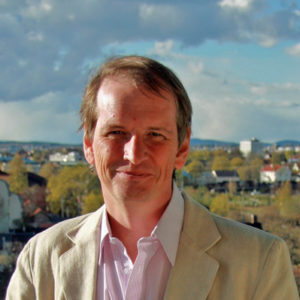 writes, researches and teaches on public policy with an emphasis on economic and environmental interactions. His main interests are interdisciplinary research on human behaviour, environmental values and the transformation of the world political economy to a more socially and environmentally just system. Appointed in 2010, he currently holds the Chair of Public Policy and Governance at the Institute for Multi-Level Governance & Development, Department of Socio-Economics, WU Vienna University of Economics and Business. He has served as Editor-in-Chief of the academic journal Environmental Values published by White Horse Press from 2007 to 2021, and as Co-editor (1987-2007) of Environment & Planning C: Government & Policy, published by Pion.
writes, researches and teaches on public policy with an emphasis on economic and environmental interactions. His main interests are interdisciplinary research on human behaviour, environmental values and the transformation of the world political economy to a more socially and environmentally just system. Appointed in 2010, he currently holds the Chair of Public Policy and Governance at the Institute for Multi-Level Governance & Development, Department of Socio-Economics, WU Vienna University of Economics and Business. He has served as Editor-in-Chief of the academic journal Environmental Values published by White Horse Press from 2007 to 2021, and as Co-editor (1987-2007) of Environment & Planning C: Government & Policy, published by Pion.
The title of his lecture at the STOREP 2022 Conference is Economic Thought and the Ecological Crisis: Disciplinary Reform or Paradigmatic Revolution.
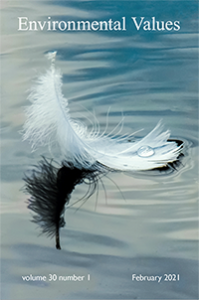 Spash is the author of the controversial report on emissions trading, first banned and then censored in Australia (see Carbon Emissions Trading) and finally published after he resigned his job, in 2010: The Brave New World of Carbon Trading, New Political Economy 15(2). He was elected to two terms as Vice-President and two terms as President of the European Society for Ecological Economics (ESEE). He has over 120 articles published in peer reviewed journals and as book chapters, two monographs and seven edited volumes. The journal Environmental Values has recently launched a call for contributions entitled “Ecological Economics and the Plurality of Values: Engaging with the Work of Clive L. Spash”, with a view to discussing “the questions and concerns that have animated Professor Spash’s work on value pluralism, ontology and methodology, and the policies and politics of transformation”.
Spash is the author of the controversial report on emissions trading, first banned and then censored in Australia (see Carbon Emissions Trading) and finally published after he resigned his job, in 2010: The Brave New World of Carbon Trading, New Political Economy 15(2). He was elected to two terms as Vice-President and two terms as President of the European Society for Ecological Economics (ESEE). He has over 120 articles published in peer reviewed journals and as book chapters, two monographs and seven edited volumes. The journal Environmental Values has recently launched a call for contributions entitled “Ecological Economics and the Plurality of Values: Engaging with the Work of Clive L. Spash”, with a view to discussing “the questions and concerns that have animated Professor Spash’s work on value pluralism, ontology and methodology, and the policies and politics of transformation”.
 Over 30 years, Clive Spash has worked on a range of subject areas and topics from the economic impacts and control of acidic deposition through atmospheric and plant science relating to urban pollution impacts on agriculture to the economics and ethics of human induced climate change and the plural values related to biodiversity. This has also involved moving away from mainstream environmental and resource economics, looking at links with natural sciences, understanding applied ethics, exploring models of democracy and public participation in political science, and linking with social psychology to develop models of human behaviour and motivation. In turn this has led him to question the foundations of accepted knowledge in both the natural and social sciences.
Over 30 years, Clive Spash has worked on a range of subject areas and topics from the economic impacts and control of acidic deposition through atmospheric and plant science relating to urban pollution impacts on agriculture to the economics and ethics of human induced climate change and the plural values related to biodiversity. This has also involved moving away from mainstream environmental and resource economics, looking at links with natural sciences, understanding applied ethics, exploring models of democracy and public participation in political science, and linking with social psychology to develop models of human behaviour and motivation. In turn this has led him to question the foundations of accepted knowledge in both the natural and social sciences.
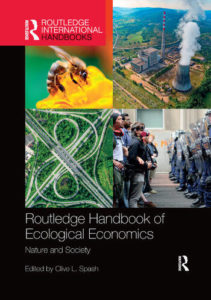 As a result he has been exploring a philosophy of science that combines and accepts realism, sociology of science, critical analysis and deconstructs the fact-value dichotomy. For some time now, he has pursued this interdisciplinary and integrative work within the context of ecological economics and more recently through the evolving agenda of a politically aware and emancipatory “Social Ecological Economics“.
As a result he has been exploring a philosophy of science that combines and accepts realism, sociology of science, critical analysis and deconstructs the fact-value dichotomy. For some time now, he has pursued this interdisciplinary and integrative work within the context of ecological economics and more recently through the evolving agenda of a politically aware and emancipatory “Social Ecological Economics“.
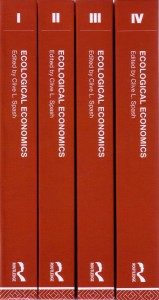 His latest book is Foundations for Social Ecological Economics which will appear in English in late 2021 but is already out in Spanish (Fundamentos para una economía ecológica y social ISBN: 978-84-1352-124-4 Madrid: FUHEM Ecosocial & Catarata (2020) 252 pages). It provides a synthesises of the variety and potential of economic thought, questions the existence of “the economy” as a singular entity and the unsustainability of models oriented to growth and capital accumulation. A set of positions is presented that provide a coherent and inclusive perspective of the ecological and social economy in ontological, epistemological, methodological and ideological terms.
His latest book is Foundations for Social Ecological Economics which will appear in English in late 2021 but is already out in Spanish (Fundamentos para una economía ecológica y social ISBN: 978-84-1352-124-4 Madrid: FUHEM Ecosocial & Catarata (2020) 252 pages). It provides a synthesises of the variety and potential of economic thought, questions the existence of “the economy” as a singular entity and the unsustainability of models oriented to growth and capital accumulation. A set of positions is presented that provide a coherent and inclusive perspective of the ecological and social economy in ontological, epistemological, methodological and ideological terms.
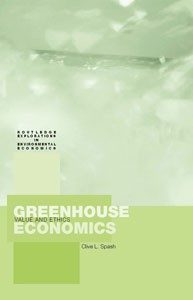 Orthodox economics has been unable to address social and environmental dimensions as aspects of crucial importance in understanding the functioning and reproduction of economic systems, on the other hand, heterodox approaches, such as socialism/Marxism, feminism, post-Keynesianism or the institutional economy, have also not been able to coherently incorporate those same dimensions into their analyses and proposals. Reformulating economics building from the heterodoxy is necessary to inform understating of the variety of economies that exist and can exist. Issues covered include: interdisciplinarity, pluralism and the integration of sciences, the relationships between orthodox and heterodox economic thinking and how an ecologically and socially transformative agenda of the economy could be designed are analysed, because “there are only alternatives!”
Orthodox economics has been unable to address social and environmental dimensions as aspects of crucial importance in understanding the functioning and reproduction of economic systems, on the other hand, heterodox approaches, such as socialism/Marxism, feminism, post-Keynesianism or the institutional economy, have also not been able to coherently incorporate those same dimensions into their analyses and proposals. Reformulating economics building from the heterodoxy is necessary to inform understating of the variety of economies that exist and can exist. Issues covered include: interdisciplinarity, pluralism and the integration of sciences, the relationships between orthodox and heterodox economic thinking and how an ecologically and socially transformative agenda of the economy could be designed are analysed, because “there are only alternatives!”
 Among Spash’s edited volumes are the Routledge Handbook of Ecological Economics: Nature and Society (2017), one of the most comprehensive single source of original work on Ecological Economics to date, and the 4 Routledge volumes on Ecological Economics of 2009 (Foundations; sustaining well-being; environmental values; policy problems and approaches).
Among Spash’s edited volumes are the Routledge Handbook of Ecological Economics: Nature and Society (2017), one of the most comprehensive single source of original work on Ecological Economics to date, and the 4 Routledge volumes on Ecological Economics of 2009 (Foundations; sustaining well-being; environmental values; policy problems and approaches).
He also co-edited, with Richard Holt and Steve Pressman, Post-Keynesian and Ecological Economics (Edward Elgar 2009). He is the author of a book on human induced climate change, Greenhouse Economics: Value and Ethics (London: Routledge 2012), and the co-author (with Nick Hanley) of Cost Benefit Analysis and the Environment for Edward Elgar, 1993, which became a standard reference and basic text widely used for teaching on the subject. [:it]![]()
Economics and the Economic System: The Ecological Transition
19th STOREP Annual Conference
Università della Tuscia, Viterbo, 26-28 May 2022
II Home ΙΙ Registration ΙΙ Invited Speakers ΙΙ Raffaelli Lecture ΙΙ INET-STOREP Initiative ΙΙ
ΙΙ Young Scholars ΙΙ General and Session Program – Special session @ Polo Universitario di Civitavecchia II
II Numbers and areas II Venue II Accommodation and social activities II
* * *
STOREP 2022 invited speaker Clive L. Spash writes, researches and teaches on public policy with an emphasis on economic and environmental interactions. His main interests are interdisciplinary research on human behaviour, environmental values and the transformation of the world political economy to a more socially and environmentally just system. Appointed in 2010, he currently holds the Chair of Public Policy and Governance at the Institute for Multi-Level Governance & Development, Department of Socio-Economics, WU Vienna University of Economics and Business. He has served as Editor-in-Chief of the academic journal Environmental Values published by White Horse Press from 2007 to 2021, and as Co-editor (1987-2007) of Environment & Planning C: Government & Policy, published by Pion.
writes, researches and teaches on public policy with an emphasis on economic and environmental interactions. His main interests are interdisciplinary research on human behaviour, environmental values and the transformation of the world political economy to a more socially and environmentally just system. Appointed in 2010, he currently holds the Chair of Public Policy and Governance at the Institute for Multi-Level Governance & Development, Department of Socio-Economics, WU Vienna University of Economics and Business. He has served as Editor-in-Chief of the academic journal Environmental Values published by White Horse Press from 2007 to 2021, and as Co-editor (1987-2007) of Environment & Planning C: Government & Policy, published by Pion.
The title of his lecture at the STOREP 2022 Conference is Economic Thought and the Ecological Crisis: Disciplinary Reform or Paradigmatic Revolution.
 Spash is the author of the controversial report on emissions trading, first banned and then censored in Australia (see Carbon Emissions Trading) and finally published after he resigned his job, in 2010: The Brave New World of Carbon Trading, New Political Economy 15(2). He was elected to two terms as Vice-President and two terms as President of the European Society for Ecological Economics (ESEE). He has over 120 articles published in peer reviewed journals and as book chapters, two monographs and seven edited volumes. The journal Environmental Values has recently launched a call for contributions entitled “Ecological Economics and the Plurality of Values: Engaging with the Work of Clive L. Spash”, with a view to discussing “the questions and concerns that have animated Professor Spash’s work on value pluralism, ontology and methodology, and the policies and politics of transformation”.
Spash is the author of the controversial report on emissions trading, first banned and then censored in Australia (see Carbon Emissions Trading) and finally published after he resigned his job, in 2010: The Brave New World of Carbon Trading, New Political Economy 15(2). He was elected to two terms as Vice-President and two terms as President of the European Society for Ecological Economics (ESEE). He has over 120 articles published in peer reviewed journals and as book chapters, two monographs and seven edited volumes. The journal Environmental Values has recently launched a call for contributions entitled “Ecological Economics and the Plurality of Values: Engaging with the Work of Clive L. Spash”, with a view to discussing “the questions and concerns that have animated Professor Spash’s work on value pluralism, ontology and methodology, and the policies and politics of transformation”.
 Over 30 years, Clive Spash has worked on a range of subject areas and topics from the economic impacts and control of acidic deposition through atmospheric and plant science relating to urban pollution impacts on agriculture to the economics and ethics of human induced climate change and the plural values related to biodiversity. This has also involved moving away from mainstream environmental and resource economics, looking at links with natural sciences, understanding applied ethics, exploring models of democracy and public participation in political science, and linking with social psychology to develop models of human behaviour and motivation. In turn this has led him to question the foundations of accepted knowledge in both the natural and social sciences.
Over 30 years, Clive Spash has worked on a range of subject areas and topics from the economic impacts and control of acidic deposition through atmospheric and plant science relating to urban pollution impacts on agriculture to the economics and ethics of human induced climate change and the plural values related to biodiversity. This has also involved moving away from mainstream environmental and resource economics, looking at links with natural sciences, understanding applied ethics, exploring models of democracy and public participation in political science, and linking with social psychology to develop models of human behaviour and motivation. In turn this has led him to question the foundations of accepted knowledge in both the natural and social sciences.
 As a result he has been exploring a philosophy of science that combines and accepts realism, sociology of science, critical analysis and deconstructs the fact-value dichotomy. For some time now, he has pursued this interdisciplinary and integrative work within the context of ecological economics and more recently through the evolving agenda of a politically aware and emancipatory “Social Ecological Economics“.
As a result he has been exploring a philosophy of science that combines and accepts realism, sociology of science, critical analysis and deconstructs the fact-value dichotomy. For some time now, he has pursued this interdisciplinary and integrative work within the context of ecological economics and more recently through the evolving agenda of a politically aware and emancipatory “Social Ecological Economics“.
 His latest book is Foundations for Social Ecological Economics which will appear in English in late 2021 but is already out in Spanish (Fundamentos para una economía ecológica y social ISBN: 978-84-1352-124-4 Madrid: FUHEM Ecosocial & Catarata (2020) 252 pages). It provides a synthesises of the variety and potential of economic thought, questions the existence of “the economy” as a singular entity and the unsustainability of models oriented to growth and capital accumulation. A set of positions is presented that provide a coherent and inclusive perspective of the ecological and social economy in ontological, epistemological, methodological and ideological terms.
His latest book is Foundations for Social Ecological Economics which will appear in English in late 2021 but is already out in Spanish (Fundamentos para una economía ecológica y social ISBN: 978-84-1352-124-4 Madrid: FUHEM Ecosocial & Catarata (2020) 252 pages). It provides a synthesises of the variety and potential of economic thought, questions the existence of “the economy” as a singular entity and the unsustainability of models oriented to growth and capital accumulation. A set of positions is presented that provide a coherent and inclusive perspective of the ecological and social economy in ontological, epistemological, methodological and ideological terms.
 Orthodox economics has been unable to address social and environmental dimensions as aspects of crucial importance in understanding the functioning and reproduction of economic systems, on the other hand, heterodox approaches, such as socialism/Marxism, feminism, post-Keynesianism or the institutional economy, have also not been able to coherently incorporate those same dimensions into their analyses and proposals. Reformulating economics building from the heterodoxy is necessary to inform understating of the variety of economies that exist and can exist. Issues covered include: interdisciplinarity, pluralism and the integration of sciences, the relationships between orthodox and heterodox economic thinking and how an ecologically and socially transformative agenda of the economy could be designed are analysed, because “there are only alternatives!”
Orthodox economics has been unable to address social and environmental dimensions as aspects of crucial importance in understanding the functioning and reproduction of economic systems, on the other hand, heterodox approaches, such as socialism/Marxism, feminism, post-Keynesianism or the institutional economy, have also not been able to coherently incorporate those same dimensions into their analyses and proposals. Reformulating economics building from the heterodoxy is necessary to inform understating of the variety of economies that exist and can exist. Issues covered include: interdisciplinarity, pluralism and the integration of sciences, the relationships between orthodox and heterodox economic thinking and how an ecologically and socially transformative agenda of the economy could be designed are analysed, because “there are only alternatives!”
 Among Spash’s edited volumes are the Routledge Handbook of Ecological Economics: Nature and Society (2017), one of the most comprehensive single source of original work on Ecological Economics to date, and the 4 Routledge volumes on Ecological Economics of 2009 (Foundations; sustaining well-being; environmental values; policy problems and approaches).
Among Spash’s edited volumes are the Routledge Handbook of Ecological Economics: Nature and Society (2017), one of the most comprehensive single source of original work on Ecological Economics to date, and the 4 Routledge volumes on Ecological Economics of 2009 (Foundations; sustaining well-being; environmental values; policy problems and approaches).
He also co-edited, with Richard Holt and Steve Pressman, Post-Keynesian and Ecological Economics (Edward Elgar 2009). He is the author of a book on human induced climate change, Greenhouse Economics: Value and Ethics (London: Routledge 2012), and the co-author (with Nick Hanley) of Cost Benefit Analysis and the Environment for Edward Elgar, 1993, which became a standard reference and basic text widely used for teaching on the subject. [:]
